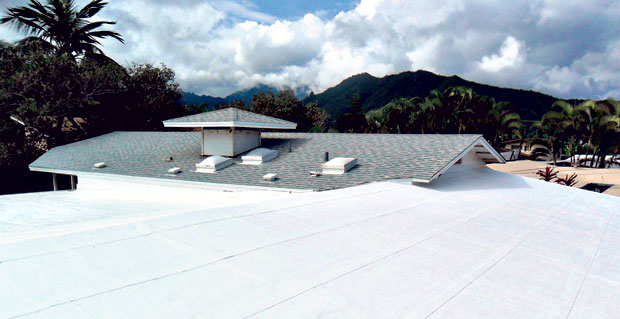With more than 20 years of experience in Hawaii’s roofing and solar industry, Shon Gregory of Surface Shield Roofing has seen the business change as materials and technologies continue to adapt to the needs and priorities of property owners.
“Our clients are becoming increasingly concerned with rising energy costs,” said Gregory. “Traditional technologies and materials are still in use, but we’re finding that more and more people are looking to advancements in roofing to help defray their costs.”
Because of our state’s dependence on imported oil, energy costs in Hawaii are the highest in the U.S., and the need to reduce the price of cooling a home or business has led to innovations. “The market demands that we work with the latest materials and technologies,” said Gregory, “because our clients want to save on their energy costs over the long term.”
In addition to traditional roofing materials such as shake, tile and shingles, Surface Shield works with coating technologies such as GacoSil, a solvent-free application that comes with a Class A fire rating and retains its ultraviolet reflective quality over the life of the coating.
“Cool roofing” is an approach that has a variety of cost and environmental benefits, and the number of home and business owners adopting that approach is growing rapidly. Because such coatings are applied to existing roofing substrate, demolition that sends waste to a landfill is unnecessary. Buildings using cool roof materials and technologies can save up to 25 percent on energy costs.
“Large commercial properties were the first to embrace cool-roofing technologies because of the size of their buildings,” said Gregory.
“But in the past few years, we’ve seen a major spike in the number of residential property owners opting to go with technologies previously used mostly by the commercial sector.”
Surface Shield also is experienced in the installation of the Solaris cool roofing system. The asphalt shingle technology is solar reflective, and capable of reducing roof temperatures up to 20 percent during summer months in Hawaii.
The Solaris system meets LEED standards, as well as Energy Star requirements for solar reflectivity and thermal emissivity. More durable than traditional roofing materials, the asphalt shingles reduce “thermal shock,” or the expansion of external building materials due to heat.
“Reducing thermal shock through systems like Solaris can help prolong the life of traditional building materials like wood and concrete,” said Gregory, “and the life of the structure.”
With a keen understanding of the dynamic nature of the building industry in Hawaii, Surface Shield is helping home and business owners utilize advancements in technologies and materials to control rising energy costs.
CONTACT: 396-9599 • surfaceshield@hawaii.rr.com
WEBSITE: www.surfaceshieldroofing.com
See more articles from: Surface Shield Roofing Company
